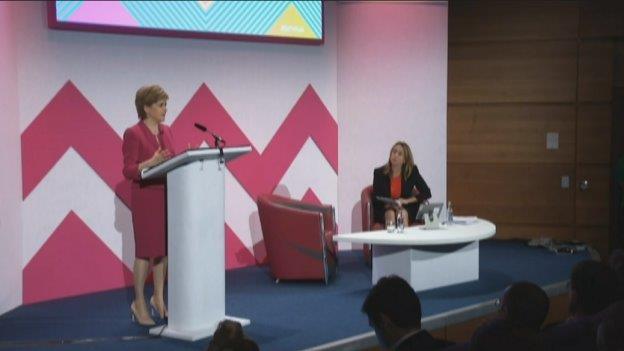What future for BBC Scotland?
- Published
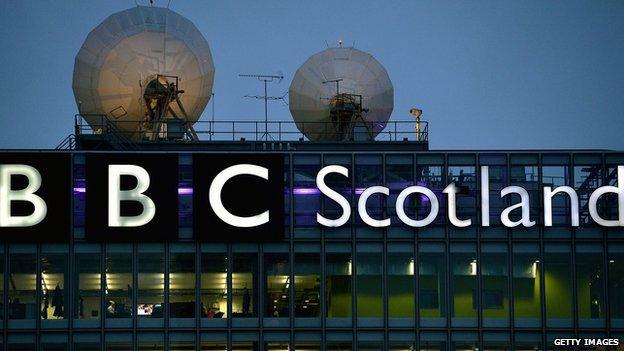
Scotland's media landscape is being bulldozed - transformed by digital technology, burgeoning choice, and quite a bit of politics - particularly as the future of the BBC is now in play.
The politics is also apparent in the newspaper sales figures for the first half of the year., external Out this week, they show the average decline at more than 10% since the first half of last year, continuing the industry's painful downward trajectory.
Scotland on Sunday saw print sales fall more than 20%. It now has an average weekly sale of less than 25,000. It doesn't have its own staff any more, relying on a journalism pool shared with its stablemate, The Scotsman.
"SoS" is now being beaten by the only weekly "regional" paper to register a rise in print sales, according to the Audit Bureau of Circulation. The Sunday Herald looked to be on its last legs, but found a niche by backing the independence cause.
Approving "Yes" campaigners backed it, with a big lift in the back half of last year, from which it's fallen back, but still retained an average 29,000 weekly sales.
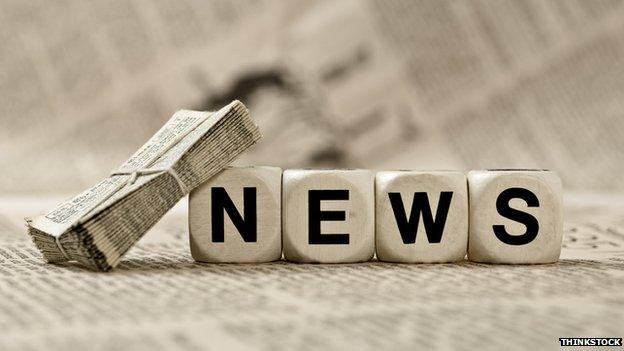
Its publisher, Newsquest, also saw a gap in the daily market for pro-independence readers. Although the figures aren't audited, we're told they're selling nearly 17,000 a day.
These are small numbers when set alongside the total sale of newspapers. The constitutional debate may have polarised opinion and changed some buying behaviour, but it can be overstated. The decline of sales in Scotland has recently been steeper than those for the rest of the UK, but the trends are similar.
Meanwhile, publishers point out there's a rise in online readership. But that's not making them enough money to sustain their cost bases. In the case of the Scotsman's figures, daily online readers are down 33% since a busy referendum period.
A new Taggart?
Those news publishers are competing with broadcasters for online readers. We've just got half year figures for STV which show it aiming to achieve its turnaround by the end of next year.
A high priority is the desire to find a new earner from making drama series, as royalties from Taggart re-runs fade to black.
It's finding the transition and investing in new services can be expensive, with an £800,000 half-year loss on its two city stations, STV Glasgow and STV Edinburgh.
They're being watched by 900,000 people in the average month which, we're told, is 30% of the potential audience. The Glasgow channel is being aimed at break-even by the end of this year.
STV also lost a wad of cash by having to bail out Mirriad, a digital advertising firm in which it invested. It may have failed to raise the finance needed without the bail-out, but it's clever stuff, "advertising to the skip generation", with personalised product placement embedded in video content.
For instance, a music video might have a street scene, in which a background billboard has ads which differ, depending on who is viewing.
Celebrity power
Advertising is not part of the BBC debate. Not yet anyway. But as the future of the licence fee is discussed, they are a sort of subliminal presence on the background billboards.
A project, financed by the BBC and published this week, sought to find out how small groups of people responded to living without the corporation's TV, radio and online content for a few days.
It concluded the group who resented having to pay the annual £145.50 missed it more than they expected, and some were despairing at the impact of adverts on their viewing of commercial channels.
Commissioning that research is part of the BBC's fight for its very existence, at least if you believe some of the interpretation of the government's green paper on how the next 10-year charter is going to change things. The charter is due to start from the end of next year.
We're half way through the consultation on that, and so far the UK government appears to have retreated from the early briefings to delighted print rivals that Auntie might as well be put in a retirement home, her funding clipped, with a remit to leave popular entertainment to the commercial market-place.
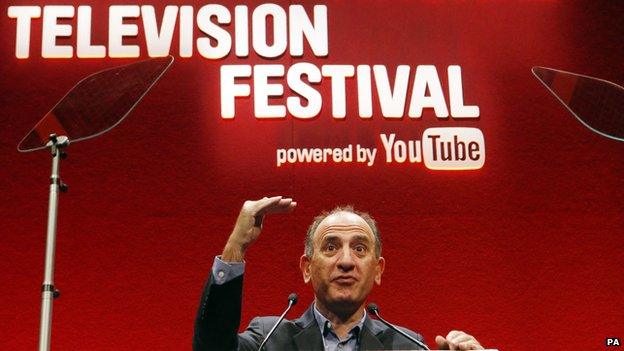
Culture Secretary John Whittingdale has been in Edinburgh for its International TV Festival this week, making reassuringly supportive comments about the BBC. He'll be aware that it has a lot of fans mobilised to defend it, including some formidable cultural celebrities. Some, including Armando Ianucci and Sue Perkins, used the Festival platform to sound off.
The context of the debate on the BBC's future in Scotland is, of course, rather different. The broadcaster's fans have not rushed forward to argue the case for it. The independence referendum seems to have left a bruised legacy of reluctance to engage.
It also left a legacy of a starkly changed political landscape, to which the BBC has to respond, even if Mr Whittingdale's green paper didn't make much of it.
The document only noted the Smith Commission's agreement that the BBC should be answerable to Holyrood on a similar basis to its accountability at Westminster (note that it's accountable for its management and use of resources, rather than its output and journalism).
On the pro-independence side, there's some tacit awareness that the broadcasting section was hardly the most compelling part of the Scottish government white paper. It proposed a new Scottish broadcaster while somehow ensuring that all the popular BBC stuff was retained.
Less tacit are vociferous critics of the BBC's political coverage, including pro-independence websites and bloggers, some threatening mass non-payment of the licence fee.
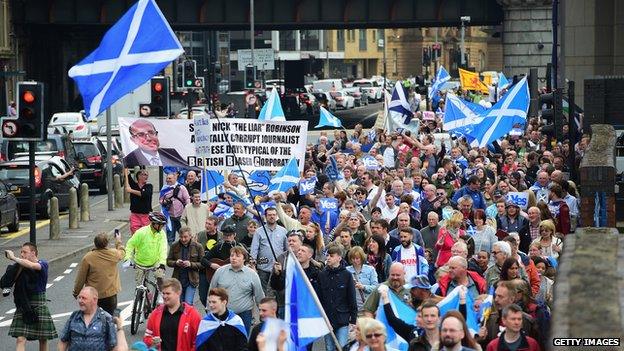
Having mobilised protests outside the BBC last year, that element continues to be fired up by Alex Salmond, in his newspaper column and promoting his book, with ever stronger condemnations of the BBC's referendum coverage.
The body set up to represent viewers, listeners and readers, the Audience Council of Scotland, took 10 months to produce a report that reflected on the referendum. When it did, it was both supportive and quite challenging of the corporation's coverage.
It said online was of "exceptional quality" (including something called "expert economic analysis" - though if there was, I missed it). But it also said coverage failed to respond to the change in campaigning style, as grass roots and social media played such a significant role.
The Council pointed to "an opportunity to review issues in the light of experience in the referendum", though it stopped short of explicitly calling for one.
So that was the complex background to Alex Salmond's successor, previously with little to say on the subject, setting out her thoughts on broadcasting, and the BBC in particular, with a speech at the TV festival., external
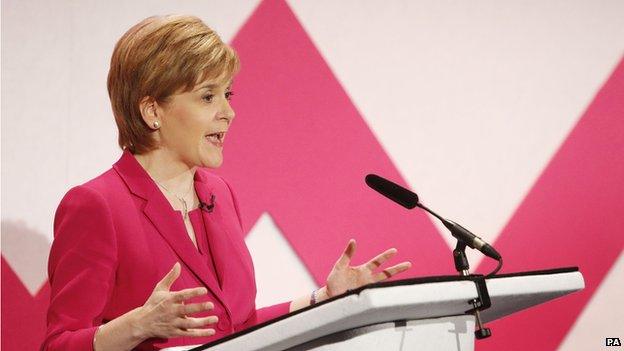
Nicola Sturgeon said she approached the subject with trepidation. Her speech was very carefully worded. It's hard to believe this was anything like the speech Alex Salmond would have delivered.
Criticism of the BBC's campaign coverage last year was measured. The first minister said she saw no "institutional bias", and praised at least some BBC Scotland journalism.
She went on to argue that there was a failure to strike the right balance between holding independence plans up to scrutiny on a parallel basis with the prospects for remaining within the UK.
"The status quo and the consequences of voting 'No' were not really analysed at all," she claimed, voicing the irritation of those who feel there wasn't a level playing field.
And she cited the Audience Council in support of her view that London-based journalists had failed to catch the mood of Scots audiences. Their broad brush reports jarred, it was argued, with the detailed scrutiny of issues that had long been debated at every level of Scottish society.
BBC management responded to her speech with a statement beginning: "We believe our coverage of the referendum was rigorously impartial and in line with our guidelines on fairness and impartiality".
Eastenders no more
The Sturgeon speech then turned its focus on the future. For her followers, it's worth noting a change of direction - no longer talk of a Scottish Broadcasting Service splitting from the BBC, but a federal structure.
The design appears to allow for either devolution or independence. That way, it helps to disarm Ms Sturgeon's constitutional opponents in their claims that an independent Scotland would be deprived of Eastenders, Strictly Come Dancing and Sir David Attenborough.
The governance requires a Scottish board of overseers, she said, while the output requires a Scottish TV channel (in addition to BBC Alba in Gaelic), and a sibling station for BBC Radio Scotland.
Her most forthright criticism was of the BBC's past attempts to avoid becoming a leader of constitutional change by refusing the pressure to split its flagship network news coverage, at 6 and 10 o'clock, for a different perspective from Scotland for Scots.
"The criticism that should be levied at the BBC is not that it has tried to lead constitutional change," said the first minister. "It is that it has totally failed to follow it.
"The UK has changed dramatically since devolution, but broadcasters are still catching up with its consequences. And although that poses questions for all public service broadcasters, the issue is maybe most acute with the BBC."
Portraying Scots
The message was aimed at Mr Whittingdale to some extent, but more so at the BBC. So how will it respond?
Last month, the official answer to concerns about a lack of trust was to point to large audiences for the flagship news programme, Reporting Scotland. And even last month, these were "early days" for a debate about changes to governance.
Not any longer. Not with a BBC Trust survey finding that only 48% of Scots think that the corporation reflects their lives. That's lower than other parts of the UK.
That BBC spokesman's reaction to the first minister's speech continued: "We recognise that there is audience demand for greater representation and portrayal of Scottish audiences on all BBC services and we want this to be part of our response in charter review.
"The BBC's funding has now been set for the next five years and this will mean cuts across the BBC.
"We will have to balance our investment on pan-UK services with dedicated services in the Nations (Scotland, Wales and Northern Ireland). We will aim to protect spending in the Nations so that content investment is cut less than in other parts of the BBC."
Expect more on that from the Beeb next month. With the first minister's speech, an important debate on the future of the media in Scotland has only (at last) just begun.
- Published27 August 2015
